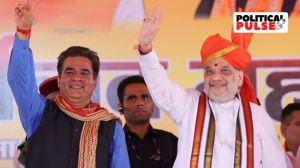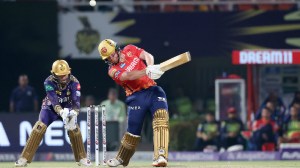- India
- International
Of children who attend their parents’ marriage
While Romuben’s maternal house is brimming with people, her groom Dhrangi is sweating under the neem tree in an open field outside her house waiting for the next ritual.
 Romu Parmar with her children before the wedding. Source: Bhavesh Ravat
Romu Parmar with her children before the wedding. Source: Bhavesh Ravat
Five-year-old Jyotsna is too shy to say how she feels to see her father and mother getting married in their thatched roof hut on Friday. Her younger brother Vikram, one-and-a-half year old, won’t stop crying on his mother’s lap. While, her seven-year-old elder brother gave a miss to the wedding and preferred to join them at the dinner.
Sohan Dhrangi and Romu Parmar in their mid-twenties, belong to the Bhil tribe, and have been staying together for the past 10 years at Kajavas village of Poshina taluka in Sabarkantha district.
While Romuben’s maternal house is brimming with people, her groom Dhrangi is sweating under the neem tree in an open field outside her house waiting for the next ritual.
About 25 people, mostly women, are dancing and chit-chatting, surrounding Dhrangi under the partially cloudy sky. This is a scene of a typical tribal wedding that takes places with the onset of monsoon.
“In our custom, we do the ‘hagaai’ (Sagaai or engagement) first and start living like husband and wife. Once we have children, we go for the wedding. In our case, the marriage was delayed a bit more since we couldn’t arrange money to bear the expense, otherwise it takes only couple of years,” said Dhrangi, sporting dark black goggles, three watches in his left hand and four bracelets on his right hand which were gifted to him by his relatives.

It may look like the wedding is a mere formality, but a little bit of inquiry reveals how performing the rituals is a must. If the couple, after engagement, doesn’t perform the wedding it will have an adverse effect on their children. The society will shun them for good.
“Wedding is a must. Children of such parents will not be accepted by any family in our community. The girls will not get groom and the vice versa. This is a system that compels us to wed no matter how much you delay it,” said Makan Parmar, brother of Romuben.
Besides having this custom what makes a tribal’s wedding different is the fact that they marry only during the monsoon. The three months beginning mid June till August has traditionally been the wedding season for the tribals. They say it is this season they have inherited from their ancestors as wedding season. The logic, they said, is that with the beginning of monsoon they get their hard earned money so they can spend, besides the rains bring the temperature down.
“We get our earnings this time around that allows us to spend. Besides, weather is also mild because of the rains. I don’t know exactly why we wed during this period, but this is how our ancestors have been following it,” said Parsuram Parmar, a retired primary school teacher at Poshina.
While explaining the rituals, he said that in most of the cases parents find the match. The groom side would approach the bride side. Once decided, the groom’s parents will throw a feast in which liquor is a must. Parmar said that earlier it was only locally made ‘Mahuda’ (country-made liquor) which has now been replaced by Indian-made foreign liquor (IMFL) and sometimes even beer is fine.
“After the drinking, the relationship is formalised with a piece of jaggery. This we called Hagaai or Sagpan or engagement. The other interesting aspect of the wedding is the dowry, which is given by the groom and not by bride’s parents. The amount of dowry and precious items is based on people’s economic condition,” Parmar said.
“If the couple fail to have babies, they are free to part ways and look for another match. But the girl has to be compensated. This is not a taboo here,” he added.
“Such wedding prevails across the tribes in the Gujarat and this is a highly civilised system. However, it is changing and becoming like a Hindu wedding. But so far, for them marriage (engagement) is a social contract while wedding is a religious ritual,” said Ganesh Devy, a noted tribal rights activist and a scholar.
It’s wedding season
POSHINA: At Poshina market, tribal bride-grooms are seen dressed in wedding outfits, roaming around the market for shopping with their children and relatives. The road between Khedbrahma (Sabarkantha) and Poshina is flanked by wedding venues where tribals have been moving in large numbers from one wedding venue to another on overloaded trucks and jeeps. The beating of drums, loudspeakers blaring wedding songs in Hindi and Gujarati. ENS
Apr 26: Latest News
- 01
- 02
- 03
- 04
- 05







































